Tommie Jones loves her job as a quality control inspector for Cook Medical in rural Spencer, Indiana. But she hasn't been able to find a place she can afford on her own, so at age 47, she's squeezed in with her sister's family.
When Cook announced a year ago that it would build hundreds of homes to sell to employees at below-market prices, Jones was among the first to sign up.
On a recent afternoon before her shift, she's bursting with excitement as she gets her first visit inside the nearly finished three-bedroom, two-bathroom ranch house. "It's so beautiful!" she says, walking around to check out every detail. She marvels at the Lazy Susan cabinet in the kitchen, the lush green view of the backyard and the size of the primary-bedroom closet.
"This is as big as my room now," she says.
Cook's move isn't purely philanthropic. As rents and home prices across the U.S. have skyrocketed, more companies are finding it harder to recruit and retain middle-income workers. Record-high job openings and low unemployment have made the competition worse, fueling staff shortages.
So a growing number of employers around the country have decided to build their own housing for workers, mostly for them to rent but sometimes to buy. They include big names like Disney and Meta, the meatpacker JBS and local school systems and health care providers. Elon Musk is reportedly planning a new neighborhood in Texas for employees of his companies SpaceX, Tesla and Boring. The trend underscores the scale of the country's affordable housing shortage and the ripple effects it has on the wider economy.
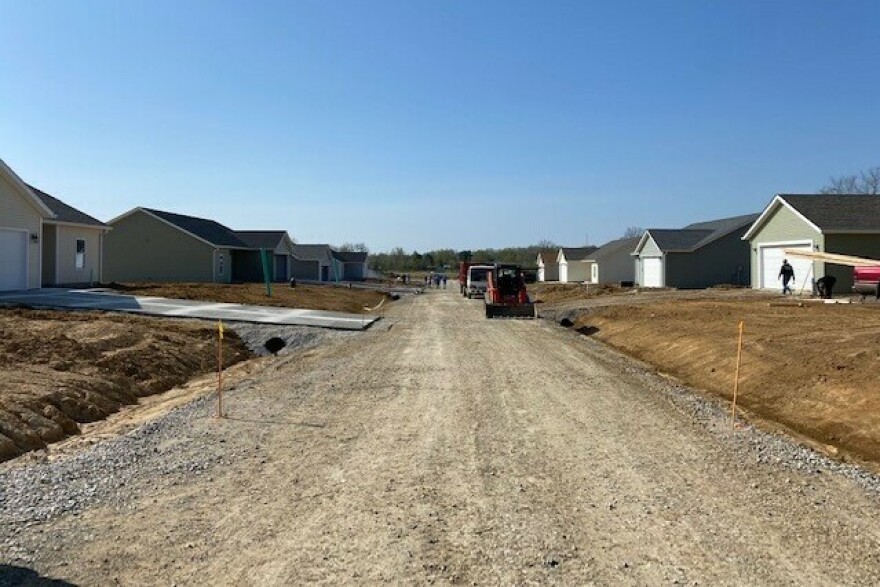
In Spencer, Cook's brand-new subdivision, Pike Place, is taking shape in what used to be a wheat field. Two rows of clapboard ranch homes — 14 so far — now line a dirt road. As Jones visits, a construction crew is pouring concrete driveways.
At first, she wasn't sure she wanted to see work colleagues on her off-hours. "But they're all super-nice," she says. "I can see us helping each other out if we need it and that it's going to be a community."
Cook is offering these homes to employees at below-market prices. It's an incredible opportunity for Jones, who has been with the company nearly four years and — with extra pay for the swing shift and her work as a trainer — makes just over $20 an hour.
"I would have never imagined I could have a new house on what I make, but I can," she says. "I get a little emotional."
It's tough being a big employer where there's "no place to live"
Cook is by far the largest employer in the area, with some 700 people at its Spencer plant alone. Based in nearby Bloomington, it manufactures medical devices like catheters and needles, part of a booming global industry. It offers solid jobs that don't require a college degree, but many of its workers can hardly afford to live near Spencer.
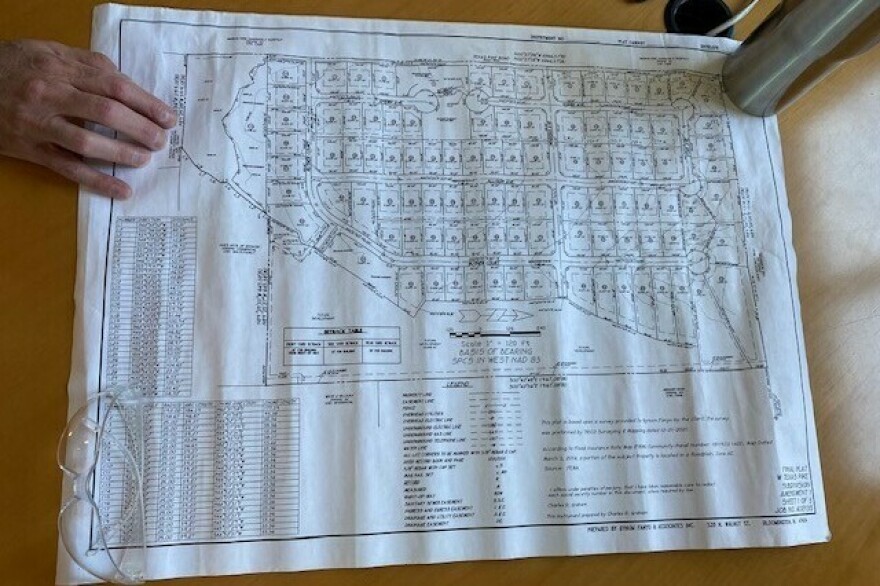
The town is tiny, just a few blocks around a central square. The entire county's population is only about 20,000. There hasn't been much new housing for years, and what has been built is too pricey for plant workers on hourly wages. Older, cheaper homes often get snapped up by buyers with cash, and they might need expensive upgrades. Cook employees were having to live farther out, meaning increasingly long commutes.
"Availability of labor is just really short," says Steve Ferguson, chairman of the board of Cook Group, the parent company of Cook Medical. "And you're trying to hire young people to come, and there's no place to live."
To keep home prices low, Cook cut a deal
In a 2021 company survey, 136 people said they were interested in buying a house. But as Ferguson researched the lack of affordable places, he was told that contractors don't want to build smaller homes because there's not much profit in them. And banks don't want to finance smaller mortgages because they carry more risk for less profit.
What about simply raising workers' pay? Median U.S. wages have long failed to keep pace with rising housing costs. But Ferguson says that raising pay won't create new homes. And he didn't want to build rental units, because he says it's too messy to be both employer and landlord. He's also thinking bigger.
"You don't build communities with apartments and rentals," he says. "And people don't build wealth living in apartments." Instead, he wanted to build houses where people could "raise their kids and live there their entire life."
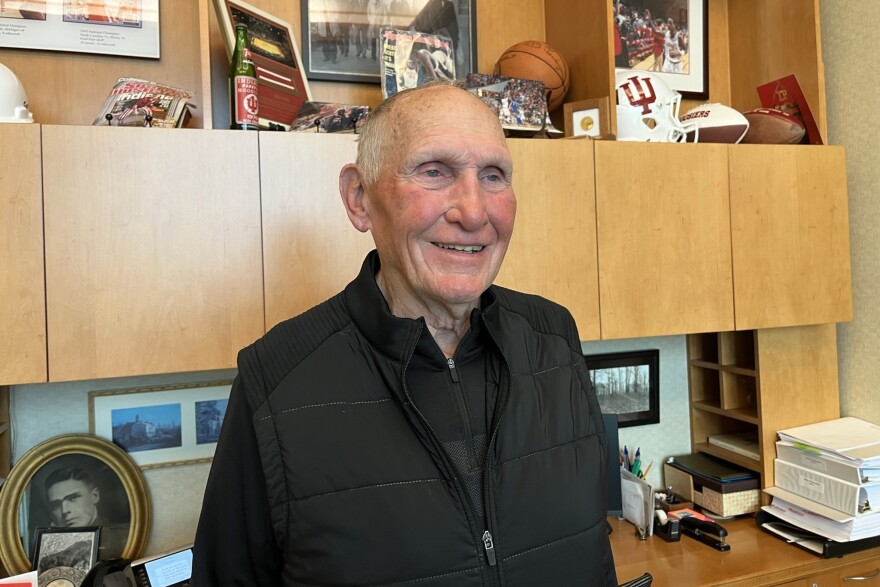
The new homes are roughly 1,300 to 1,500 square feet. Ferguson originally wanted to price them all under $200,000 and keep monthly mortgage payments no more than $1,000, but then inflation spiked, along with construction costs. So the houses are priced between $188,000 and $212,000.
To keep prices that low, Cook cut a deal. The builder works at scale — with no risk since there's a guaranteed buyer — and there are no real estate agent fees. Cook held homebuying workshops to help interested employees prepare and connected them with local banks that could finance a mortgage. People who still need help paying, like Tommie Jones, can get it from a federal loan program for rural buyers.
Local officials also helped extend sewer lines, water lines and roads to the new homes, and one key advantage was the lack of much zoning regulation. That means the project faced little opposition beyond neighbors lamenting the loss of open space.
To Ferguson, building homes for Cook employees revives a long tradition of business solving a problem when governments can't or won't. The U.S. has a history of company towns, most famously by the luxury rail-car maker Pullman in Illinois. A century ago right here in Bloomington, he says, the Showers Brothers furniture-maker helped finance homes for its employees.
Ferguson hopes Cook can be a model and says it has gotten calls about the project from companies in other parts of the country. "We now have a crisis nationwide," he says, "and I think business has to deal with it."
"I don't think this will solve the problem"
But housing experts say the U.S. shortage is too vast for business alone to fix. "I don't think this will solve the problem," says Katie Fallon, who studies housing supply at the Urban Institute.
She also doesn't think companies truly want to become housing providers, though she understands the pressure that's driving them to step in. "We have desperately needed housing supply for 15, 20 years," she says. "The rate of housing production has just slowed so drastically over time."
Fallon says there's a need for more federal and state housing subsidies and for money to rehab buildings that are falling into disrepair. She'd also like to see states and cities open up their zoning so that it's harder to block new construction of affordable housing.
Still, she says anything that adds more supply is good.
In Spencer, the head of the local chamber of commerce thinks the Cook homes could be transformative and encourage other development. Marce King has helped out by organizing a lottery for would-be buyers, since the company did not want to be in charge of picking who gets homes.
She also recently held an open house for interested workers and their families and says she found the experience surreal after watching the local population shrink for more than a decade. "For this young couple to walk through the door, and they were prepped and ready ... and they had smiles on their faces," King says. "It's so exciting."
The new homeowners will face some limits on reselling
Cook's long-term plan is for 99 houses in the Spencer subdivision and a couple of hundred more in a different county, where many workers commute to its plant in Bloomington. Officials have said they might build even more homes if there are still workers wanting to buy them. The company's goal is to sell at cost and break even financially.
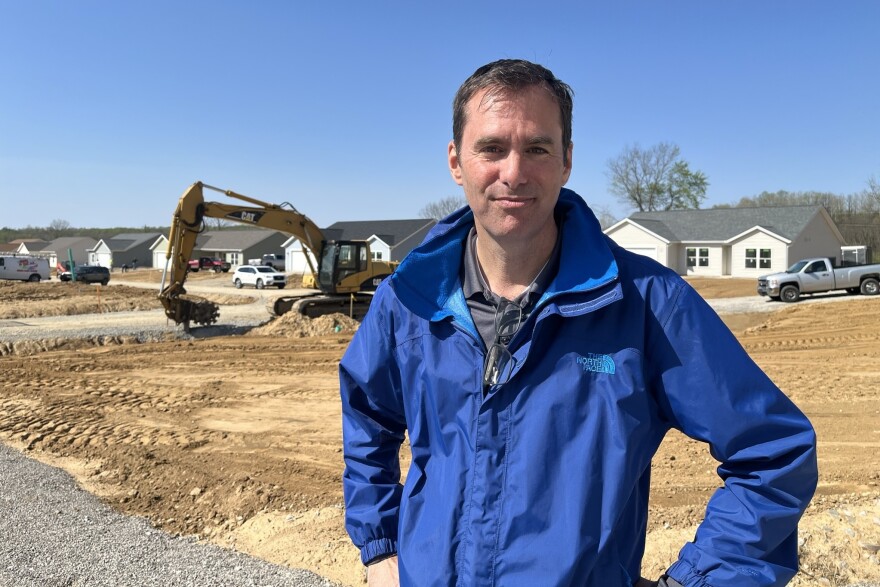
Once employees buy, they are not required to stay with Cook. But Ron Walker, who heads the Cook Group company that's developing the Pike Place subdivision, says there are a few other requirements.
First, buyers must live in the home and not rent it out. If they want to sell within the first three years, "we have the option to buy it back at the price we sold it to you," Walker says. "And we're doing that to keep people from trying to flip these homes in short order."
For four more years after that, homeowners will be able to sell at market price, but Cook will still have first dibs to buy it back, he says, "in case there was still a demand by Cook employees to get into this neighborhood."
Only 10 of the first 14 houses found buyers immediately. Walker says some interested employees can't break their lease yet or need more time to improve their credit scores or save for a down payment. Others say they're waiting for the next round of construction, which will include two-story homes with four bedrooms.
Cook expects demand to grow as people see the neighborhood develop. But if at any point there are homes with no takers within the company, they'll be opened up for anyone. "We know the community needs them, and they need them at this price range," Walker says.
First homes will be move-in ready by summer
Shelby and Ryan Bixler can hardly wait to move into their new home. They're both quality control inspectors at Cook and just sold another house to come here. It's an older one out in the country that they bought three years ago, and it needed lots of updating.
"There just wasn't much on the marketplace, and so we had to just grab what there was," Shelby Bixler says. When they put their old place on the market, it got snapped up in five days, so they are living with family until the move.
As they walk around their new home, they admire the bigger bedrooms and "humongous" closets. The couple did think twice about trading the country for a subdivision with houses so close. But they've warmed up to the idea. They have a toddler, and they're excited to be near all the schools she'll attend in town.
"Living right next to people, I think, will be fun, especially as our daughter is able to start playing with friends, and neighbor friends, and having people over," Shelby Bixler says.
Plus, they already know and like one neighbor — Tommie Jones, whose house is right across the street.
Jones already has her things boxed up to go and has been buying wall decorations for months, planning where to put everything. She has picked out which room she'll have ready for her niece and nephew to stay over in.
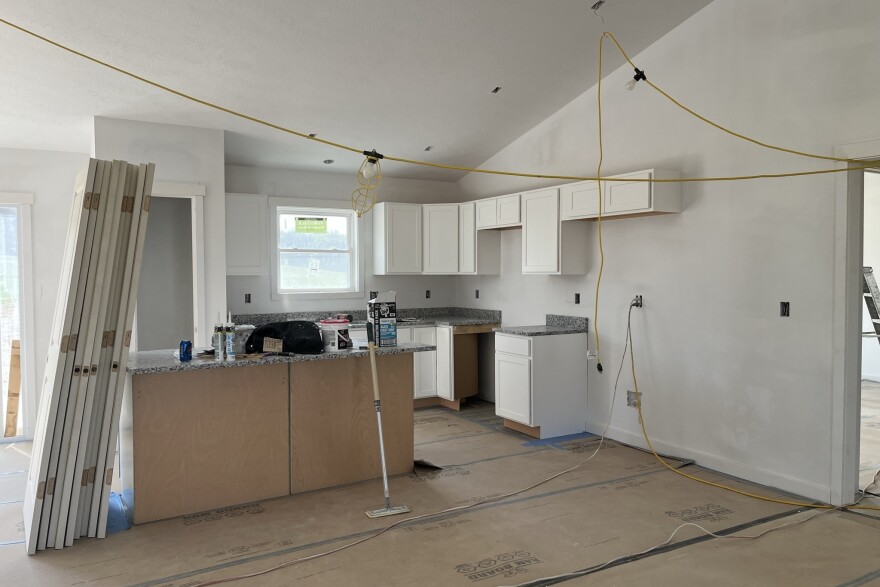
The financing process has been exhausting, she says, though she's grateful to Cook for guiding her through it. If not for that, she says, "I would have never got financing, because I didn't know what to do."
Jones has been so anxious to see her new house that she has made multiple trips to peek through the windows as it takes shape. She dreams of the day when she'll finally move in.
"I'm gonna lay down on the floor and just nap," she says, laughing. "Because it's mine, and I can."
Copyright 2023 NPR. To see more, visit https://www.npr.org.




